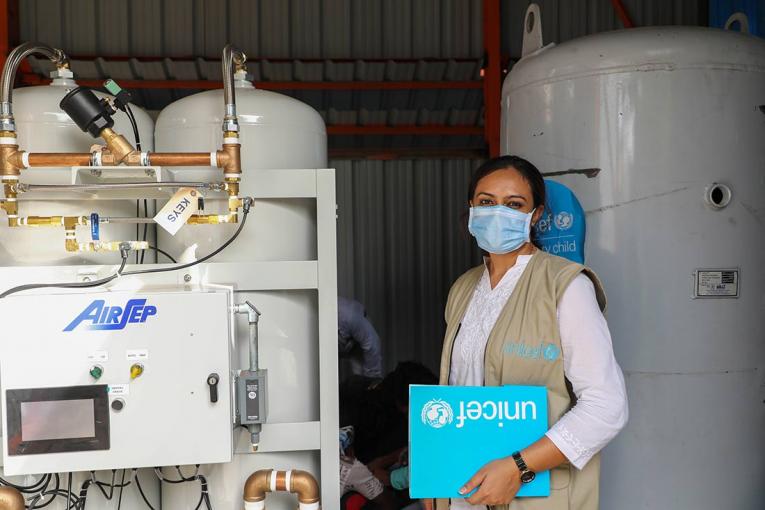
UNICEF supports 26 oxygen plants and sends over 4,000 oxygen concentrators, and other critical supplies as India continues to grapple with COVID-19
UNICEF Supply Division, 8 June 2021
UNICEF continues its emergency support to India’s COVID-19 pandemic response by providing additional lifesaving supplies. The first nine of 26 oxygen plants are being installed, and over 4,500 oxygen concentrators and 200 RT-PCR testing machines have already been delivered or are being delivered.
As India battles the second wave of COVID-19, a critical shortage of oxygen for treating patients with respiratory diseases has posed a major challenge. In an accelerated effort to expand access to oxygen care, testing and screening, UNICEF is helping to install 9 oxygen generating plants across hospitals in Gujarat, Arunachal Pradesh, and Tripura. All 26 oxygen generating plants are for installation in hospitals in Arunachal Pradesh, Gujarat, Nagaland, Maharashtra, Meghalaya and Tripura.
“The deadly COVID-19 surge has put enormous pressure on health care facilities in India. At the heart of the crisis is the desperate need for oxygen. For those suffering from severe COVID-19, oxygen support in time can make the difference between life and death,” said Dr. Yasmin Ali Haque, UNICEF Representative in India. “Thanks to our donors and supporters across the world, UNICEF’s timely support in providing oxygen generating plants and over 4,500 oxygen concentrators will help save lives at this critical time. By building oxygen systems, we can respond to the current emergency as well as a range of health needs over the longer term.”
“Thanks to our donors and supporters across the world, UNICEF’s timely support in providing oxygen generating plants and over 4,500 oxygen concentrators will help save lives at this critical time. By building oxygen systems, we can respond to the current emergency as well as a range of health needs over the longer term.”
UNICEF will also procure an additional 14 oxygen generating plants over the next months. In a plant, the piped oxygen is supplied straight to the patient’s hospital bed. It will be used for treating severe cases of COVID-19, sick newborns and children with pneumonia, as well as in supporting mothers with birth complications, and keeping patients stable during surgeries.
UNICEF is also delivering 4,650 life-saving oxygen concentrators procured as part of the Access to COVID-19 Tools Accelerator (ACT-A) initiative for the immediate response in Arunachal Pradesh, Manipur, Sikkim, Rajasthan, Gujarat, West Bengal and other states.
The concentrator takes in air from the environment and produces a continuous source of oxygen. Another 3,000 oxygen concentrators previously procured are in use in Uttar Pradesh and Uttarakhand. In addition, 512 High Flow Nasal Cannulas have been delivered to 10 states.
Other supplies and support provided by UNICEF include:
- To support COVID-19 vaccinations in India and routine vaccination for children in the longer term, UNICEF has procured and supplied over 238,272 pieces of cold chain equipment, including walk-in coolers, walk-in freezers, ice lined refrigerators, deep freezers, solar direct drive fridges, cold boxes, vaccine carriers, including freeze-free vaccine carriers, and voltage stabilizers. These equipment strengthen vaccine storage at national and all state levels as well as in 523 districts through augmenting 1389 cold chain points.
- To support testing efforts in the country, UNICEF in partnership with the Indian Council for Medical Research (ICMR) has installed 85 RT-PCR testing machines in 73 laboratories of 25 states. An additional 200 machines will also be delivered. 100 RNA extraction machines are also under procurement.
- 74 mass thermal scanners have been procured, delivered and are being installed in 24 airports and 11 seaports to screen incoming passengers for fever.
- In May 2021, UNICEF delivered 8.5 million triple layered masks and 1.75 million face shields across India. This personal protective equipment is critical so that functionaries can continue essential services in the villages and hospitals.
UNICEF is working with state governments and partners to ensure that children left unattended or orphaned due to COVID-19 are supported in tracing their extended families e.g., grandparents, provided with counselling support or brought to shelter homes and reported to the national CHILDLINE.
According to the Ministry of Women and Child Development, 577 children have lost their parents to COVID-19 from 1 April to 25 May. UNICEF also works with state governments to develop advisories and protocols for communities, hospitals etc. for children who have lost either one or both parents or if parents are in hospital and children need temporary care. UNICEF builds capacities of the frontline functionaries so that they can support these children.
Original article here.